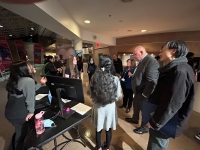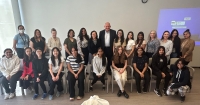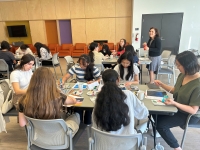Girls in STEAM: Gender Equity in Digital Literacy
Markham Public Library
Innovation Synopsis
Based on research on the STEM (Science, Technology, Engineering, Math) gender gap, Markham Public Library staff created a mentorship-based community leadership program for young women interested in STEM careers. Over 8 weeks, participants collaborated with local women leaders in Markham's education, technology and engineering sectors, to create STEM-based solutions to community issues. The participants used the library's makerspaces and digital labs to create a prototype or demonstration for their projects, which included innovations such as robotic pants, a mobile digital lab, and a food waste reduction lab. The participants received individual mentoring support during the session and participated in weekly lessons with library staff on digital literacy topics including 3D Printing, coding, design, and research skills. The program helped the participants develop confidence and a sense of inclusion in STEM education and built a community of mutual support.
Challenge/Opportunity
Women are underrepresented in STEM, making up approximately 30% of the field. There is an observable trend that while all genders tend to have similar levels of interest in STEM as children, by age 11-13, intention to pursue STEM education or employment in girls drops off significantly. Research in the UK on this phenomenon revealed four factors to explain this: lack of social support, lack of mentorship or role models, lack of confidence gained through demonstrated success and lack of hands-on learning.
This is a relevant issue in Markham, ON, population approx 370,000, given its large ICT and innovation sector. The City of Markham has a strong commitment to digital literacy, inclusion and supporting youth, and the library has expertise and experience with makerspace technology and digital literacy. MPL staff developed this program to achieve the outcomes related to gender inclusion, for young women at the critical point in their STEM education.
Key Elements of Innovation
This program was designed and executed by members of the library's digital literacy, information services and community engagement departments. The program was designed to run over 8 weeks. The participants were assigned groups and paired with a mentor to support them. The curricula were delivered in weekly micro-lessons, on a range of practical digital literacy skills. The groups identified a community issue they would like to address, then used the MPL makerspaces to develop a STEM-based solution. The program culminated with a graduation ceremony with certificates of completion awarded by the Mayor, and demonstrations of their innovations for families and friends at City Hall.
The program was innovative in its design, and emphasis on cohort based hands-on learning. It incorporated teaching strategies that support a diversity of learning styl is rooted in research. It also addresses core priorities for libraries - inclusion, digital literacy, community and civic engagement
Achieved Outcomes
The program evaluation included an outcome assessment done through a pre- and post-program survey. The outcomes measured included:
- Had participants ever received mentorship
- Do the participants believe they can succeed in STEM (confidence)
- Do they feel STEM is important in solving community issues
The results indicated that only 1 of 12 participants had ever had a mentor. All of the respondents indicated that STEM was important for solving community issues, and by the end of the program there were increases in the measure of confidence (+30%). Qualitative feedback was also assessed. There was a high degree of satisfaction from mentors, who felt the program was uplifting and impactful. Several noted that the girls bonded quickly and developed social connections through the program. Many parents at the graduation ceremony expressed positive feedback. One mother who was an engineer said that she "wished she had a program like this so it wouldn't have felt so lonely in school".



